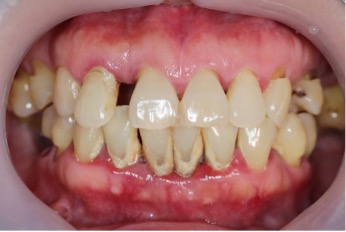Gum disease is a chronic inflammatory illness that affects many persons around the world.
Gum disease causes early tooth loss, dental disability, eating dysfunction, poor nutritional status, low self- esteem and systemic illnesses. Also, periodontal disease compromises speech, quality of life and places increased burden on the healthcare economy.
In this column, we will discuss the different types of gum diseases and how they have become a public health menace.
The scientific word for gum disease is periodontal disease. The word periodontal comes from two words, perio-around and dont-tooth. So, when we look for periodontal problems, we are looking at areas around the tooth. What’s around the tooth? If you look under the gum line, there is the root, the bone and ligaments that connect the root of the tooth to the bone.
The most common types of periodontal diseases are the following:
Chronic Periodontitis- the gradual loss of the ligament and bone support around the tooth. It creates a “pocket” that is filled with millions of bacteria and tartar.
Acute Periodontitis– a painful swelling of the gum tissue caused by bacteria and pus that develop causing rapid bone loss. This is often referred to as an “abscess”.
Gingivitis– the non-painful inflammation of the gums without any bone loss. At this stage, it is reversible and a proper professional cleaning should help.
Apical Periodontitis– the inflammation/infection and loss of bone at the end of the root caused by a dead or infected nerve within the root canal of the tooth. A traditional “root canal” procedure usually solves this issue if caught early.
Periodontal disease has significant public health implications.
Most adults suffer from some form of gum disease as it is the major cause of tooth loss in adults. The plaque in gum disease is a colony of bacteria which forms on the surface of the teeth every day. Many of the bacteria in plaque have been shown to cause aggressive bone loss and negative effects on other organs and systems in your body.
To prevent and treat gum disease, you need to make sure you remove all the plaque from your teeth every day. This is done by brushing and cleaning between the teeth with brushes or by flossing.
If gum disease is not treated or inadequately treated, it could lead to gum abscesses and pus may build up causing pain and suffering.
Since gum disease has been linked to other health conditions such as: diabetes, strokes, cardiovascular disease, poor pregnancy outcomes and even dementia; it is important not to ignore proper diagnosis and treatment. Evidence is clear that having a healthy mouth and gums can help improve your general health and reduce the cost of medical treatment.
One common sign of gum disease is blood on your toothbrush or on the toothpaste when you spit out after cleaning your teeth. Also, your gums may bleed when you are eating leaving a bad taste in your mouth causing an unpleasant breath.
Periodontal disease is a public health problem that requires action. It is a pandemic affecting more than 50% of the adult population in many nations, while its severe forms affect 11% of adults, making severe gum disease the sixth most prevalent disease in the world.
Some persons are at high risk for acquiring periodontal disease. Proper management of the disease process is done with good dental education in conjunction with behavioral changes and early diagnosis and treatment by an experienced dentist. These strategies will go a long way in reducing health care costs while providing you with a healthy smile and a good quality of life.
Dr. Kendal V. O. Major is Founder and CEO of Center for Specialized Dentistry which is a comprehensive family dental practice operating in Nassau and Freeport. He is the first Bahamian Specialist in gum diseases and dental implants since 1989. He also is a certified Fast braces provider. His practice is located at 89 Collins Avenue, Nassau at (242)325-5165 or [email protected]

Acute Periodontal disease- Gum abscess

Apical Periodontal infection- Root canal is needed

Severe Chronic Periodontal Disease





